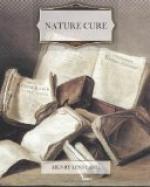Of these different waste products, uric acid causes probably the most trouble in the organism. The majority of diseases arising within the human body are due to its erratic behavior. Together with oxalic acid, it is responsible for arteriosclerosis, arthritic rheumatism and the formation of calculi.
Dr. Haig of London has done excellent work in the investigation of uric-acid poisoning, but he becomes one-sided when he makes uric acid the scapegoat for all disease conditions originating in the organism. In his philosophy of disease he fails to take into consideration the effects of other acids and systemic poisons. For instance, he does not mention the fact that carbonic acid is produced in the system somewhat similarly to the formation of coal gas in the furnace; and that its accumulation prevents the entrance of oxygen into the cells and tissues, thus causing asphyxiation or oxygen starvation, which manifests in the symptoms of anemia and tuberculosis.
Neither does Dr. Haig explain the effects of other destructive by-products formed during the digestion of starches and proteins. Sulphurous acid and sulphuric acid (vitriol), as well as phosphorus and phosphoric acids actually burn up the tissues of the body. They destroy the cellulose membranes which form the protecting skins or envelopes of the cells, dissolve the protoplasm and allow the latter to escape into the circulation. This accounts for the symptoms of Bright’s disease, the presence of albumen (cell protoplasm) in blood and urine, the clogging of the circulation, the consequent stagnation and the accumulation of blood serum (dropsy) and the final breaking down of the tissues (necrosis) resulting in open sores and ulcers.
Excess of phosphorus and the acids derived from it overstimulates the brain and the nervous system, causing nervousness, irritability, hysteria and the different forms of mania.
An example of this is the distemper of a horse when given too much oats and not enough grass or hay. The excess of phosphorus and phosphoric acids formed from the protein materials of the grain, if not neutralized by the alkaline minerals contained in grasses, hay or straw, will overstimulate and irritate the nervous system of the animal and cause it to become nervous, irritable and vicious. These symptoms disappear when the rations of oats are decreased and when more fresh grass or hay is fed in place of the grain.
Similar effects to those produced upon the horse by an excess of grains are caused in the human organism, especially in the sensitive nervous system of the child, by a surplus of protein foods, of meat, eggs, grains and pulses.
Still, when patients suffering from overstimulation of the brain and nervous system consult their doctor, his advice in almost every instance is: “Your nerves are weak and overwrought. You need plenty of good, nourishing food (broths, meat and eggs), and ’a good tonic.’”




